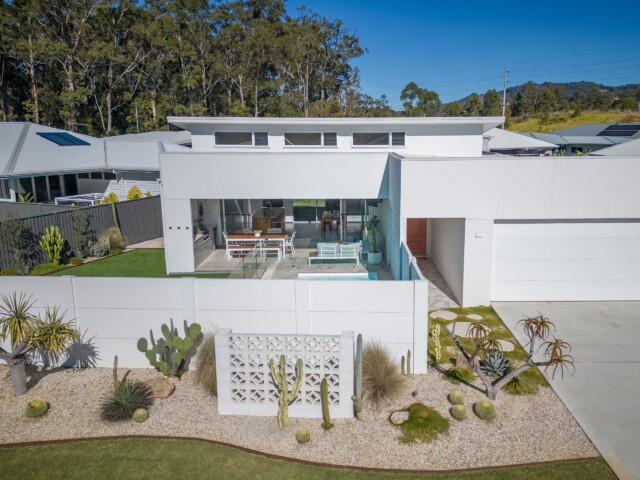It’s easy to get swept up in the aesthetics of creating a beautiful outdoor space—selecting the perfect furniture, curating colour schemes, and choosing the right plants. But amidst the focus on visual appeal, one critical aspect is often overlooked: acoustics and ways to reduce noise. Investing in peace and quiet is key to a happy home. Keep reading to discover our tips on how to reduce noise in your backyard to create a peaceful outdoor haven.
Noise pollution, whether from traffic or loud neighbours, can significantly impact your mental and physical well-being. In fact, a 2003 study by Brown and Bullen found that up to 20% of urban Australian dwellings experience noise levels exceeding World Health Organisation guidelines. This issue has likely worsened due to rising populations, infrastructure developments, and the housing boom. Effects of noise pollution include increased anxiety, stress, disturbed sleep patterns, and even a reduced lifespan.


Why you should reduce noise in your backyard
Reducing noise isn’t just about improving your Sunday morning sleep-ins. It’s an investment in your health and overall quality of life. Excessive noise can lead to stress, hearing loss, and sleep disruptions, making your home feel less like a sanctuary. A properly designed acoustic solution, noise wall or barrier can help you reclaim that sense of calm.


How to reduce noise effectively
The first step to effective noise reduction is understanding the noise source and type, and identify whether it’s best to absorb or reflect the sound.
Our handy guide to acoustic fencing dives deeper into the details, but generally:
- To reduce noise from passing cars, you’ll require a road noise barrier.
- For reducing neighbourhood noise (vocal noise from neighbours or animals, lawnmowers, music), acoustic fencing is the perfect choice.
- To reduce low-frequency noise like air-conditioning units or hot water heaters, an acoustic enclosure (typically sound-absorbing) will be your best option.


What to look for in a road noise barrier to reduce noise
When it comes to blocking road noise, here are the key factors you need to consider:
1. Fence/barrier height:
Aim for a noise barrier around 2m tall to block out traffic noise effectively. The general rule is, if you can block the line of sight, you can block much of the sound. Be sure to check local council regulations on height, as certain homes impacted by traffic noise may be subject to special exemptions.
2. Density and rigidity:
The denser the material, the more effectively the barrier will reduce noise. Our AcoustiMax® wall panels, found in products like SlimWall®, VogueWall®, TrendWall®, and EstateWall®, feature fibre cement skins laminated to a lightweight EPS core. This composite construction offers a durable, cost-effective solution for highway-adjacent homes and suburban streets alike.
3. Coverage:
Your noise barrier should extend fully to the ground without gaps or openings. Even small openings can allow noise to leak through, diminishing its effectiveness.
4. Proximity to the sound source:
The closer your fence is to the noise source (like a road), the more effective it will be at blocking sound.
5. Watch out for reflected noise:
Be aware of structures like pergolas or balconies that may reflect noise back into your yard. Ideally, these structures should be lower than your noise barrier to prevent sound from bouncing around.
Success story: Acoustic fencing boosts privacy for brand new duplex
Acoustic fencing not only reduces noise but also enhances privacy, making it an ideal solution for modern developments like duplexes. One of our recent projects successfully demonstrated how our acoustic fencing transformed a noisy outdoor area into a serene, private retreat.


Other ways to reduce noise in your outdoor space
Beyond fencing, consider these natural and aesthetic solutions to help create a peaceful environment:
- Green walls or dense foliage:
Opt for plants with year-round coverage, such as evergreens or tall grasses, to reduce noise naturally. Stagger trees and shrubs in rows for maximum coverage and layer heights for a more effective barrier.


- Water features or sound systems:
Introduce pleasant white noise with soothing water features or wind chimes to mask unwanted sounds. Alternatively, invest in a good set of outdoor speakers and queue calming, nature sounds.


Reduce noise and create your peaceful outdoor haven with ModularWalls.
Ultimately, the best noise barrier for your backyard will reduce unwanted sounds, complement your home’s aesthetic, fit your budget, and be easy to maintain. With the right combination of materials and thoughtful design, you can finally relax in your own serene oasis—free from the stress of noise pollution.
*The maximum height attainable for the different wall types will be influenced by various factors, including wind regions, soil conditions, topography and shielding.



